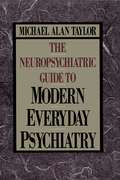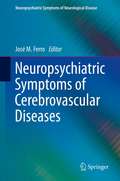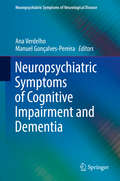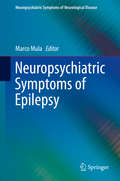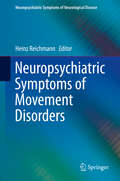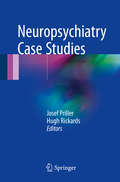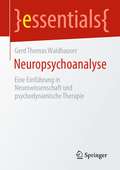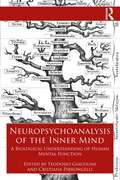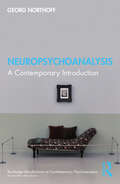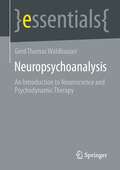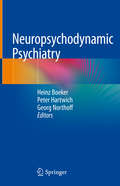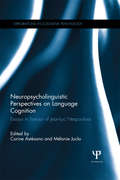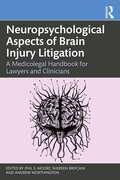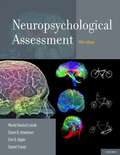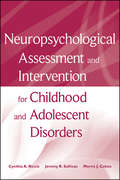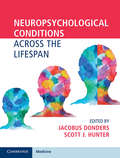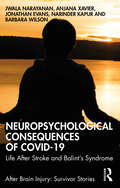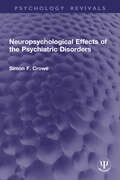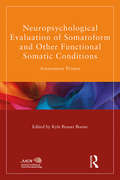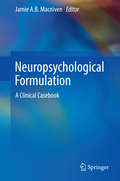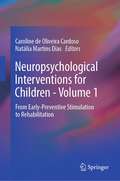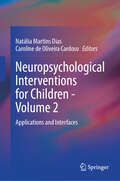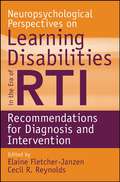- Table View
- List View
Neuropsychiatric Guide to Modern Everyday Psychiatry
by Michael Alan TaylorPresents a new view of psychiatry, blending traditional biologic, neuro- and descriptive psychiatry into a broad neuropsychiatric approach to diagnosis and treatment. Incorporating step-by-step assessment and management strategies, Taylor provides a practical guide for clinical care.
Neuropsychiatric Symptoms of Cerebrovascular Diseases
by José M. FerroNeuropsychiatric Symptoms of Cerebrovascular Diseases is an up-to-date, comprehensive review of the neuropsychiatry of stroke, by active authorities in the field, with an emphasis on diagnostic and management issues. Neuropsychiatric Symptoms of Cerebrovascular Diseases includes critical appraisal of the methodological aspects and limitations of the current research on the neuropsychiatry of stroke and on unanswered questions/controversies. Pharmacological aspects of management are discussed, to provide robust information on drug dosages, side effects and interaction, in order to enable the reader to manage these patients more safely. Illustrative cases provide real life scenarios that are clinically relevant and engaging to read. Neuropsychiatric Symptoms of Cerebrovascular Diseases is aimed at neurologists, stroke physicians and psychiatrists, and will also be of interest to intensive care doctors, psychologists ad neuropsychologists, research and specialist nurses, clinical researchers and methodologists.
Neuropsychiatric Symptoms of Cognitive Impairment and Dementia
by Ana Verdelho Manuel Gonçalves-PereiraThis book is an up-to-date, comprehensive review of the neuropsychiatry of different types of cognitive impairment by active authorities in the field. There is an emphasis on diagnostic and management issues. Cognitive impairment both with and without criteria for dementia is covered. A critical appraisal of the methodological aspects and limitations of the current research on the neuropsychiatry of cognitive impairment and dementia is included. Unanswered questions and controversies are addressed. Non-pharmacological and pharmacological aspects of management are discussed, to provide robust information on drug dosages, side effects and interaction, in order to enable the reader to manage these patients more safely. Illustrative cases provide real life scenarios that are clinically relevant and engaging to read. Neuropsychiatric Symptoms of Cognitive Impairment and Dementia is aimed at neurologists, psychiatrists, gerontologists, and general physicians. It will also be of interest to intensive care doctors, psychologists and neuropsychologists, research and specialist nurses, clinical researchers and methodologists.
Neuropsychiatric Symptoms of Epilepsy
by Marco MulaThis book is an up-to-date, comprehensive review of the neuropsychiatry of epilepsy, by active authorities in the field, with an emphasis on clinical and management issues. A critical appraisal of the methodology and limitations of current research on the neuropsychiatry of epilepsy is provided, and unanswered questions and controversies are addressed. Pharmacological aspects of management are also discussed in order to enable the reader to manage these patients more safely. Neuropsychiatric Symptoms of Epilepsy is aimed at neurologists, epileptologists, psychiatrists and neuropsychiatrists, and will also be of interest to psychologists and neuropsychologists, research and specialist nurses, clinical researchers and methodologists.
Neuropsychiatric Symptoms of Movement Disorders
by Heinz ReichmannThis is an up-to-date, comprehensive review of the neuropsychiatry of patients with movement disorders, i. e. Parkinson's disease, Huntington's disease, dystonia and others, by active authorities in the field, with an emphasis on diagnostic and management issues. This book includes critical appraisal of the methodological aspects and limitations of the current research on the neuropsychiatry of movement disorders and on unanswered questions/controversies. Symptomatology and pharmacological aspects of management are discussed, to provide robust information on drug dosages, side effects and interaction, in order to enable the reader to manage these patients more safely. Illustrative cases provide real life scenarios that are clinically relevant and engaging to read. Neuropsychiatric Symptoms of Movement Disorders is aimed at neurologists, movement disorder specialists and psychiatrists and will also be of interest to intensive care doctors, psychologists and neuropsychologists, research and specialist nurses, clinical researchers and methodologists.
Neuropsychiatry Case Studies
by Josef Priller Hugh RickardsThis book comprises succinct, accessible clinical cases in neuropsychiatry. Each clinical case has a specific and practical learning point, concerned with assessment, diagnosis, treatment or general approach. Each case models clinical reasoning and shows how the 'puzzle' in the case changed the future practice of the author. Neuropsychiatry Case Studies is divided into sections relating to specific areas of neuropsychiatry, including dementias, movement disorders, autoimmune encephalopathies and epilepsy, amongst others. This book is aimed at trainee doctors in neurology and psychiatry and will also be of interest to fully trained doctors, nurses, psychologists and other allied health professionals working in this area.
Neuropsychoanalyse: Eine Einführung in Neurowissenschaft und psychodynamische Therapie (essentials)
by Gerd Thomas WaldhauserNeurowissenschaft und Psychoanalyse erscheinen zunächst als zwei grundsätzlich verschiedene, unvereinbare Zugänge zum menschlichen Erleben und Verhalten. Allerdings gab es schon seit Beginn der Entwicklung der Psychoanalyse immer wieder Bestrebungen, psychoanalytische Konzepte und Prozesse neurowissenschaftlich zu begründen. Auf der anderen Seite liefert die Psychoanalyse ein umfassendes Modell der menschlichen Psyche in all ihrer Komplexität und Dynamik, welches helfen könnte, die vielfältigen und häufig sehr spezialisierten Ergebnisse der modernen Hirnforschung in ihrer Gesamtheit zu verstehen. Das vorliegende Buch fasst den momentanen Stand der Forschung in diesem Schnittbereich zwischen Tiefenpsychologie und Hirnforschung zusammen und arbeitet heraus, wie sowohl Praktiker als auch Grundlagenforscher von einem fruchtbaren Austausch zwischen den beiden Disziplinen profitieren können.
Neuropsychoanalysis of the Inner Mind: A Biological Understanding of Human Mental Function
by Teodosio GiacoliniThis comprehensive and well-curated collection explores how neuroscience can be integrated into psychoanalytic thinking and practice, reexamining the biological science within psychological (sexuality, pleasure, and dreams), social (pornography), and psychopathological (learning and attention disorders, anhedonia) phenomena relevant to therapists and analysts. Neuropsychoanalysis of the Inner Mind stands out for its focus on the emotional-motivational aspects of the mind, which are considered through the lenses of affective neuroscience, psychoanalytic theory and neuropsychoanalysis, and is important reading for scholars and psychologists interested in the topics originally addressed by Freud in his 1895 publication Project for a Scientific Psychology.
Neuropsychoanalysis: A Contemporary Introduction (Routledge Introductions to Contemporary Psychoanalysis)
by Georg NorthoffGeorg Northoff presents the first introduction to neuropsychoanalysis and the search for a brain-based understanding and explanation of our psyche and its psychodynamic features. This book covers the key features of psychodynamics, including the concepts of self, narcissism, defence mechanisms, unconsciousness/consciousness, attachment and trauma, energy/cathexis, and depression/schizophrenia. After reviewing past and current state-of-the-art models and their limitations, Northoff uniquely links these psychodynamic features to temporal and spatial features in the brain (and body). The key element in connecting brain and mind is dynamic, the pattern of change over time: from brain dynamic to psychodynamic - dynamic is thus shared by brain and psyche as their "common currency". This spatiotemporal approach offers novel and sometimes surprising insights into the elusive connection of brain and mind. Ultimately, this carries important clinico-therapeutic implications for psychodynamic psychotherapy in a spatiotemporal sense, such as through spatiotemporal psychotherapy. This accessible volume will be of great interest to neuroscientists, neuropsychoanalysts, psychologists, psychoanalysts, and anyone interested in the brain-mind connection. Additional material for the present book including figures and tables as well as short talks about each chapter can be found on this website (www.georgnorthoff.com) including the author’s YouTube channel.
Neuropsychoanalysis: An Introduction to Neuroscience and Psychodynamic Therapy (essentials)
by Gerd Thomas WaldhauserNeuroscience and psychoanalysis initially appear as two fundamentally different, incompatible approaches to human experience and behavior. However, from the very beginning of the development of psychoanalysis, there have been repeated efforts to ground psychoanalytic concepts and processes in neuroscience. On the other hand, psychoanalysis provides a comprehensive model of the human psyche in all its complexity and dynamics, which could help to understand the diverse and often highly specialized findings of modern brain research in their entirety. This book summarizes the current state of research in this area of intersection between depth psychology and brain research and elaborates how both practitioners and basic researchers can benefit from a fruitful exchange between the two disciplines.
Neuropsychodynamic Psychiatry
by Georg Northoff Peter Hartwich Heinz BoekerThis book presents a comprehensive neuropsychodynamic strategy for treating psychiatric disorders. Rather than pursuing an exclusively biological, psychological, or psychodynamic approach, it offers a methodology that links all three aspects in a unifying, integrative model. Central to this approach is the view of the brain as a bio-psychosocial organ in a neuro-ecological model, rather than the purely neuronal model often presupposed in current neuroscience and psychiatry. Moreover, the book views psychopathological symptoms as spatiotemporal disorders of the altered spatiotemporal structure spanning the brain and its surrounding world. The relation between one of the core symptoms and altered neuronal activity calls for the development of integrated, circular neuropsychodynamic models of psychopathological symptoms in severe psychiatric disorders and their treatment.
Neuropsycholinguistic Perspectives on Language Cognition: Essays in honour of Jean-Luc Nespoulous (Explorations in Cognitive Psychology)
by Corine Astesano Mélanie JuclaThis book brings together experts from the fields of linguistics, psychology and neuroscience to explore how a multidisciplinary approach can impact on research into the neurocognition of language. International contributors present cutting-edge research from cognitive and developmental psychology, neuropsychology, psycholinguistics and computer science, and discuss how this contributes to neuropsycholinguistics, a term coined by Jean-Luc Nespoulous, to whom this book is dedicated.Chapters illustrate how researchers with different methods and theoretical backgrounds can contribute to a unified vision of the study of language cognition. Reinterpreting neuropsycholinguistics through the lens of each research field, the book demonstrates important attempts to adopt a comprehensive view of speech and language pathology.Divided into three sections the book covers: <P><P> <li>linguistic mechanisms and the architecture of language <li>the relationship between language and other cognitive processes <li>the assessment of speech and language disabilities and compensatory mechanisms. <P><P>Neuropsycholinguistic Perspectives on Language Cognition presents a unique contribution to cognitive science and language science, from linguistics to neuroscience. It will interest academics and scholars in the field, as well as medical researchers, psychologists, and speech and language therapists.
Neuropsychological Aspects of Brain Injury Litigation: A Medicolegal Handbook for Lawyers and Clinicians
by Phil S. MooreThis accessible handbook focuses on the importance of neuropsychological evidence and the role of the neuropsychologist as expert witness in brain injury litigation. This thorough, evidence-based resource fosters discussion between the legal profession and expert neuropsychological witnesses. The chapters reflect collaborations between leading personal injury lawyers and neuropsychologists in the UK. Key issues in brain injury litigation are addressed that are essential to an understanding of the role of the neuropsychologist as expert witness and of neuropsychological evidence for the courts. These include neuropsychological testing, assessment of quantum, vocational rehabilitation, mental capacity, forensic outcomes, the frontal paradox, mild traumatic brain injury and more. Combining the scientific and legal background with practical tips and case examples, this book is valuable reading for legal professionals, particularly those working in personal injury and clinical negligence, as well as trainees, students and clinicians in the field of neuropsychology, neurorehabilitation and clinical psychology.
Neuropsychological Assessment , Fifth Edition
by Muriel Deutsch Lezak Diane B. Howieson Erin D. Bigler Daniel TranelNow in its Fifth Edition, Neuropsychological Assessment reviews the major neurobehavioral disorders associated with brain dysfunction and injury. This is the 35th anniversary of the landmark first edition. As with previous editions, this edition provides a comprehensive coverage of the field of adult clinical neuropsychology in a single source. By virtue of the authors' clinical and research specializations, this book provides a broad-based and in-depth coverage of current neuroscience research and clinical neuropsychology practice. While the new edition is updated to include new features and topics, it remains true to the highly-regarded previous editions. Methods for obtaining optimum data are given in the form of hypothesis-testing techniques, clinical tips, and clinical examples. In the seven years since the previous edition, many advancements have been made in techniques for examining brain function and in our knowledge about brain-behavior relationships. For example, a surge of functional imaging data has emerged and new structural imaging techniques have provided exquisite detail about brain structure. For the first time, this edition includes examples of these advancements, many in stunning color. This edition also includes new tools for clinicians such as a neuroimaging primer and a comparison table of the neuropsychological features of progressive dementias. The chapters on assessment procedures include discussion of issues related to test selection and reviews of recently published as well as older test batteries used in general neuropsychological assessment, plus newly developed batteries for specific issues.
Neuropsychological Assessment and Intervention for Childhood and Adolescent Disorders
by Morris J. Cohen Jeremy R. Sullivan Cynthia A. RiccioA compelling and compassionate case study approach to a broad range of neuropsychological disordersNeuropsychological Assessment and Intervention for Childhood and Adolescent Disorders focuses on the neuropsychological assessment and evidence-based practices available for assessing and treating children living with the etiological and neurological components of various disorders. Each chapter provides one or more case studies along with helpful background information, assessment results, and recommendations based on assessment data.Bridging science and practice, the book reviews the scientific literature, research on clinical implications, and evidence-based treatment of such disorders as:Dyslexia and DyscalculiaSpecific Language Impairment/DysphasiaAutism Spectrum DisordersAttention-Deficit/Hyperactivity DisorderTourette SyndromeTraumatic Brain InjuryChildhood CancerEpilepsyCerebrovascular DiseaseLow Birth WeightEnvironmental Toxin ExposureNeurotoxins, Pregnancy, and Subsequent DisordersChromosomal AnomaliesNeurocutaneous DisordersMetabolic DisordersEach case study complements the content of each chapter by illustrating how the assessment process can inform intervention efforts for children. In addition, the cases humanize the effects of various disorders and demonstrate the usefulness of neuropsychological information in treatment and intervention planning, especially within children's educational and social contexts.
Neuropsychological Conditions Across the Lifespan
by Jacobus Donders Scott J. HunterThis unique analysis of neuropsychological conditions provides readers with a review of both pediatric and adult presentations in one convenient place. Covering the most common disorders encountered in clinical practice, including those specific to the extremes of the age spectrum, this book provides dedicated chapters on: • Preterm and low weight birth • Spina bifida myelomeningocele • Autism spectrum disorder • Intellectual disability • Fetal alcohol spectrum disorders • Attention-deficit/hyperactivity disorder • Learning disability • Traumatic brain injury • Cancer • Epilepsy • Human immunodeficiency virus • Multiple sclerosis • Stroke • Dementia Each chapter provides evidence-based guidelines that can be readily applied to daily practice.
Neuropsychological Consequences of COVID-19: Life After Stroke and Balint's Syndrome (ISSN)
by Barbara Wilson Jonathan Evans Narinder Kapur Jwala Narayanan Anjana XavierNeuropsychological Consequences of COVID-19 focuses on Anjana’s journey as a COVID survivor following a brain injury that left her with a very rare neuropsychological syndrome called Balint’s syndrome, a disorder associated with difficulties in visual and spatial coordination. It is also the first book of its kind to provide a first-hand account from India on surviving brain injury, from diagnosis, recovery and rehabilitation, providing the therapeutic milieu in the Indian context and exploring cultural influences on rehabilitation.Written jointly by Anjana, her neuropsychologist and the international experts in the field of neuropsychology who were also involved in her diagnosis and care, the book highlights how COVID-19, a virus primarily affecting the respiratory system, can also result in a disabling brain injury. It describes Anjana’s recovery and the rehabilitation she received and provides a deeper understanding of this experience of a very rare condition through the views of Anjana herself. In addition, Anjana’s rehabilitation journey stumbles upon many important themes of rehabilitation including cultural sensitivity, personal identity, resilience, role of family and rehabilitation in a low to middle income country.This book is valuable reading for clinical and neuropsychologists, neurologists, other rehabilitation therapists including physiotherapists, occupational therapists, nurses and social work professionals, particularly those interested in cross cultural rehabilitation. It will also be of interest to students in these fields.
Neuropsychological Effects of the Psychiatric Disorders (Psychology Revivals)
by Simon F. CroweOriginally published in 1998, Neuropsychological Effects of the Psychiatric Disorders provided a comprehensive review of the background and literature concerning effects of the psychiatric disorders on cognitive functions at the time. It follows the classification of disease proposed by the Diagnostic and Statistical Manual of Mental Disorders (DSM-IV) and each condition is described in terms of its history, details regarding physical investigations of brain functioning in the disorder, and an extensive review and formulation of the implications of that disorder to cognitive functioning. A selective review of cognitive effects of treatments of the psychiatric disorders both pharmacological and physical is also included.Each chapter features a fully worked case of a disorder in association with the background and presentation of the patient, as well as a full listing of the patient’s performance on specific neuropsychological tests. Techniques for differentiating dementia from depressive illness, as well as clinical guidelines and decision rules in areas of the factitious and dissociative disorders are described. The text is written with an eye to the history of these conditions and contains anecdotal material regarding interesting findings and red herrings.
Neuropsychological Evaluation of Somatoform and Other Functional Somatic Conditions: Assessment Primer (American Academy of Clinical Neuropsychology/Routledge Continuing Education Series)
by Kyle Brauer BooneNeuropsychologists are provided with little formal education and training regarding the identification and measurement of somatoform symptoms, yet these conditions are highly prevalent, with estimates indicating that 20% of general medical patients and 30% of neurologic clinic patients present with symptoms lacking medical explanation. This book provides neuropsychologists with comprehensive information and specific practice recommendations for the assessment of patients with somatoform conditions. The first four chapters discuss the genesis of somatoform and other functional somatic symptom disorders, and the next seven chapters address somatoform conditions in the context of nonepileptic seizures, multiple chemical sensitivity and other claimed toxic exposures, pseudotremor and other nonphysiologic movement disorders, postconcussion syndrome, chronic pain/fibromyalgia/complex regional pain syndrome, attention deficit disorder, and auto-immune disease. Chapters are also included that address the use of the MMPI-2-RF in differentiating somatoform disorder and malingering, medically unexplained symptoms in non-English-speaking individuals; workplace factors in somatization; and testimony involving somatoform conditions. The book is targeted for practicing neuropsychologists, clinical psychologists including those specializing in behavioral medicine, and students in training.
Neuropsychological Formulation
by Jamie A.B. MacnivenThis forward-looking reference defines and illustrates the process and themes of formulation in neuropsychology and places it in the vanguard of current practice. The book explains the types of information that go into formulations, how they are gathered, and how they are synthesized into a clinically useful presentation describing psychological conditions resulting from neurological illness or injury. Cases highlight the relevance and flexibility of narrative- and diagram-based formulation methods in approaching a diverse range of issues and conditions, from decisional capacity to cultural considerations, Huntington's disease to deep dyslexia. Throughout this volume, formulation is shown as integral to treatment and rehabilitation planning alongside clinical assessment, cognitive testing, and diagnosis. Included among the topics: The interface of neuroimaging with neuropsychological findings in traumatic brain injury. Neuropsychological aspects of temporal-lobe epilepsy: seeking evidence-based practice. An integrative approach to differential diagnosis of subarachnoid hemorrhage and Korsakoff's dementia. Educational disengagement following mild TBI in childhood. Themes in the formulation of repeat assessments. Cognitive neuropsychological formulation. Formulation is essential in good neuropsychological assessment as it provides the foundation for appropriate intervention by bringi ng together the results of different evaluations into a coherent whole. . . . Macniven's compelling and constructive book has assembled internationally known experts from diverse backgrounds to provide illumination of their own views and approaches to formulation, which makes the book a pleasure to read and should establish it as essential reading on clinical psychology and neuropsychology training courses. - Professor Barbara A. Wilson OBE, Ph. D. ,D. Sc. Neuropsychologists, clinical psychologists, and rehabilitation specialists will find Neuropsychological Formulation of critical importance not only to the literature of the field, but also to the developing role of clinical neuropsychology within healthcare systems.
Neuropsychological Interventions for Children - Volume 1: From Early-Preventive Stimulation to Rehabilitation
by Caroline de Oliveira Cardoso Natália Martins DiasThis book is the first of two volumes that aim to serve as a comprehensive guide for professionals working with neuropsychological interventions especially designed for children. This first volume presents the theoretical foundations, tips and guidelines for neuropsychologists to develop different interventions, such as stimulation and early intervention with a focus on promoting neuropsychological health; habilitation, appropriate for work with neurodevelopment disorders; and rehabilitation, in cases of structural alterations. In this sense, it reflects the editors' concern to provide material with practical tips, but theoretically grounded, and truly useful to professionals in clinical and also school contexts. This first volume is divided into two parts. The first addresses the theoretical and practical foundations of child neuropsychological assessment and intervention. Neuropsychological assessment is discussed, with a focus on its role in guiding intervention. Also, different types of interventions are presented, and a taxonomy is offered, according to its differential objectives of promotion or remediation and the target population (typical development, functional or structural alterations of the Nervous System), leading to the suggestion of three types of interventions in neuropsychology in both clinical and school contexts: 1) Early preventive Intervention; 2) Habilitation and 3) Rehabilitation. Cognitive stimulation in different contexts, such as school, family and clinical, is also discussed, exploring how teachers and parents can also collaborate in intervention processes, expanding the possibilities for action beyond the clinical context. A section concludes by addressing the importance of the feedback and the neuropsychological assessment report.The second part focuses specifically on stimulation and rehabilitation, offering chapters that target specific skills such as attention, memory, executive functions and academic skills, among others. The chapters summarize evidence, bring tips and illustrate existing materials and programs, in a continuous articulation between theory-evidence-practice. Originally published in Portuguese and now available in English, Neuropsychological Interventions for Children – Volumes 1 and 2 will be of interest to professionals working with neuropsychology in clinical and school contexts. It will also be useful in neuropsychology teaching contexts (specialization courses in neuropsychology and related areas) and for students and professionals in interface areas, such as Psychology, Education, Speech Therapy, Occupational Therapy among others. The translation of the original Portuguese version of this book into English was done with the help of artificial intelligence. A subsequent human revision was done primarily in terms of content.
Neuropsychological Interventions for Children - Volume 2: Applications and Interfaces
by Caroline de Oliveira Cardoso Natália Martins DiasThis book is the second of two volumes that aim to serve as a comprehensive guide for professionals working with neuropsychological interventions especially designed for children. This second volume complements the theoretical and practical foundations presented in the first volume by presenting applications to different clinical conditions and by exploring interfaces of neuropsychology with other areas of research and practice. Chapters in this second volume are divided into two parts. The first part presents a series of case studies, illustrating the practice and experience of neuropsychological rehabilitation and habilitation in different clinical conditions. The second part brings together chapters that discuss the interfaces of neuropsychology with different areas, which can use its knowledge and interventions (such as school neuropsychology) or which can be used as strategies within neuropsychological intervention or even compose inter and transdisciplinary partnerships in the work of promotion, stimulation, or cognitive remediation, such as the use and role of music, games and play, mindfulness, and transcranial direct current stimulation. So, chapters in this second part highlight the interfaces with other approaches, knowledges or disciplines. Originally published in Portuguese and now available in English, Neuropsychological Interventions for Children – Volumes 1 and 2 will be of interest to professionals working with neuropsychology in clinical and school contexts. It will also be useful in neuropsychology teaching contexts (specialization courses in neuropsychology and related areas) and for students and professionals in interface areas, such as Psychology, Education, Speech Therapy, Occupational Therapy among others. The translation of the original Portuguese version of this book into English was done with the help of artificial intelligence. A subsequent human revision was done primarily in terms of content.
Neuropsychological Neurology
by A. J. LarnerEssential to the management of patients suffering from neurological disorders is an understanding of the cognitive aspects of these conditions. This book begins with an outline of the various cognitive domains and how they can be tested, before covering in depth the cognitive deficits seen not only in prototypical neurodegenerative cognitive disorders (Alzheimer's disease, frontotemporal dementias, Huntington's disease, prionoses), but also in other common neurological disorders which may be complicated by cognitive impairment (stroke, multiple sclerosis, Parkinson's disease, brain tumours). This book is an essential reference text for all neurologists, not just those with an interest in cognitive disorders; and for general physicians and specialists who deal with any endocrine, metabolic, vascular, or infective disorders which may compromise cognitive function. Practitioners of professions allied to medicine which involve contact with cognitively impaired patients will also find this text useful.
Neuropsychological Perspectives on Learning Disabilities in the Era of RTI
by Elaine Reynolds Fletcher-Janzen Cecil R.An insightful look at the role of neuroscience and neuropsychology as it relates to Response to Intervention (RTI) in learning disability diagnosis, treatment, and policy reform Neuropsychological Perspectives on Learning Disabilities in the Era of RTI is a revolutionary new volume presenting the latest research--in question-and-answer format--from leading scholars about the contributions of neuroscience and neuropsychology as it relates to Response to Intervention (RTI) in learning disability identification, diagnosis, and recommended interventions. This collective work includes contributions from more than thirty neuroscientists, neuropsychologists, clinical psychologists, and school psychologists with training in brain-behavior relationships, who explore the answers to questions including: How do you reconcile RTI as a means of diagnosis of learning disability with knowledge from the clinical neurosciences?? What do you think neuroscience has to offer laws and policies associated with learning disability determination? What do you think neuroscience has to offer the assessment and identification of learning disabilities? What role does neurocognitive science play in designing interventions in the context of RTI? What role does neuropsychology have to play in the diagnosis of learning disability? Featuring contributions from leaders in the field of neuropsychology and school psychology, and with a Foreword from Sally Shaywitz, Neuropsychological Perspectives on Learning Disabilities in the Era of RTI illuminates the contributions of neuro-science and neuropsychology to learning disability identification and current educational reform.
Neuropsychological Rehabilitation
by Barbara A. Wilson Fergus Gracey Jonathan J. Evans Andrew BatemanAfter an introduction to the current theories and research findings related to brain injury rehabilitation, this text presents 20 case studies of adults who sustained severe brain damage caused by traumatic head injuries, encephalitis, stroke, hypoxia and other conditions. Problems that follow such injuries are analyzed in detail; these include loss of self-care skills, memory impairment, and language, reading, visuoperceptual and behavioral difficulties. The chapters describe the lifestyle of each individual before the onset of brain damage and the subsequent symptoms, neuropsychological assessment, rehabilitation, and long-term outcome of their condition. Most chapters include a report by the patient and/or family member, thus enhancing the reader's understanding of the predicaments faced by brain-injured individuals as they learn to cope with traumatic changes in lifestyle. Although improvement for those with severe brain injuries is slow and limited, the patients described in the book made some progress after their admission to rehabilitation services. The exhaustive analysis of each case and a step-by-step description of management will serve as an inspiring and informative guide for students, professionals and other caregivers.
